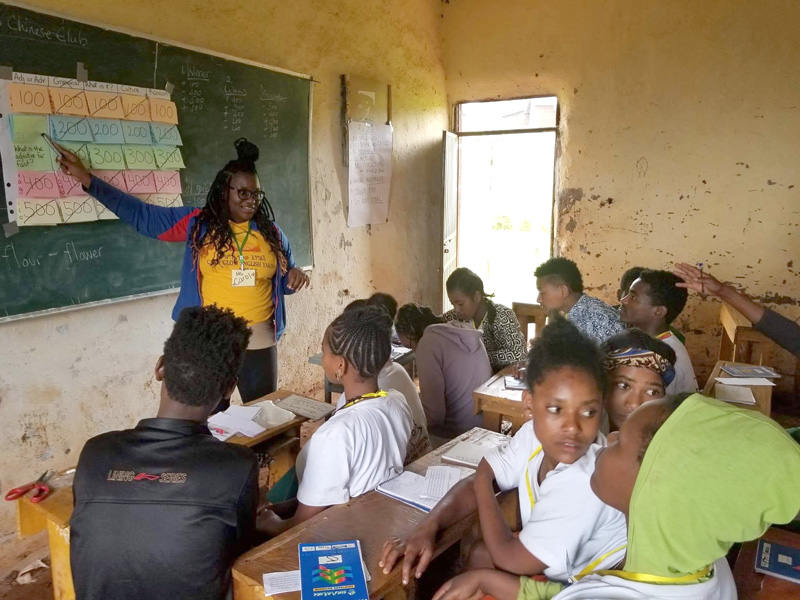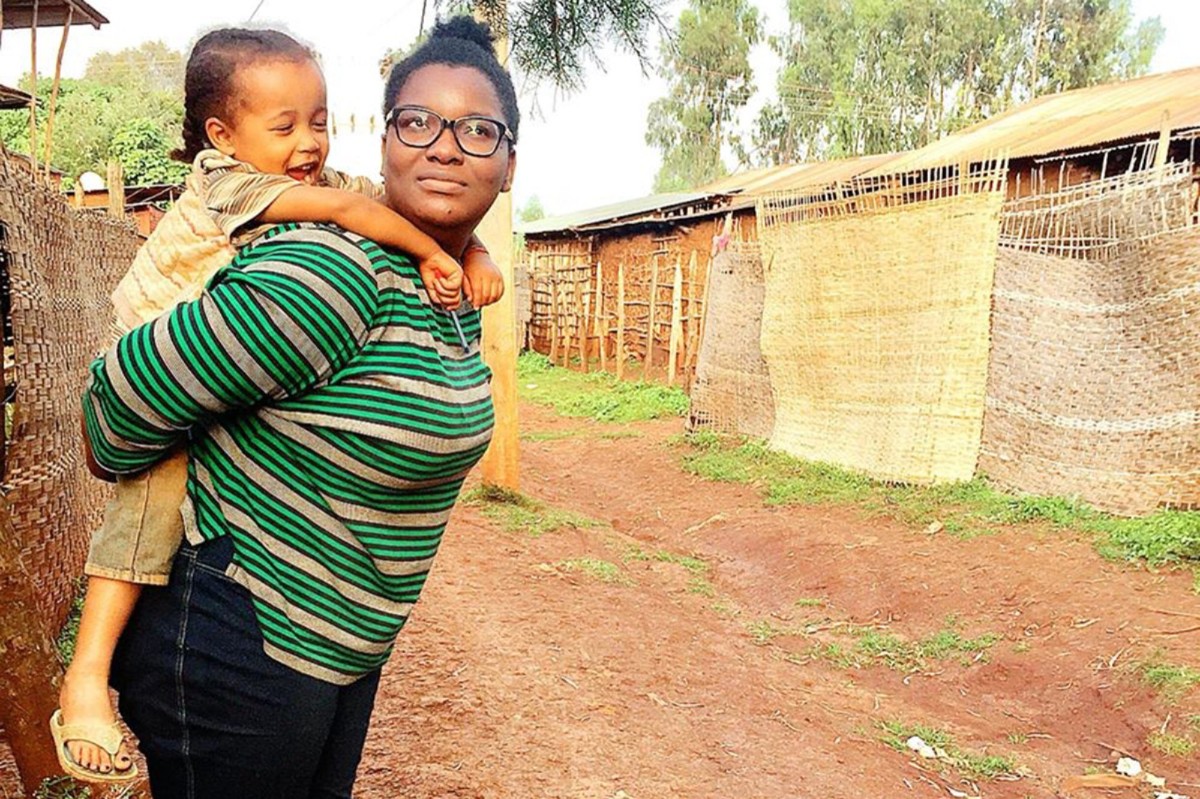To fully grasp what it means to Carolyn Swen to receive a master’s degree from Teachers College in International Educational Development, you have to start with her childhood in Liberia.
“I was born during a period in which warring factions recruited boys as child soldiers, and girls were getting kidnapped or raped — we literally couldn’t go to school, at all,” says Swen.
Still, learning was prized, and it continued. Swen recalls being taught by young village women whose college educations had been interrupted by conflict.
“Girls who could no longer go to university taught me,” she says. “I learned by repeating the sounds of the alphabet, watching educational videos when we had electricity, writing with chalk on the streets, and using sticks to write letters in the mud during the rainy season.”
Swen’s family eventually fled to Sierra Leone, where, at age eight, she sat in a classroom for the first time.
I learned by repeating the sounds of the alphabet, watching educational videos when we had electricity, writing with chalk on the streets, and using sticks to write letters in the mud during the rainy season.
— Carolyn Swen, M.A. ’20, International Educational Development
“It was an epiphany!” Swen says, the memory undiminished by time. “I heard angels singing! I thought I was in paradise, in heaven. It was magical.”
Swen remained in Sierra Leone (a country enduring its own civil unrest) until 2004, when her family received refugee status and moved to Abilene, Texas. Her mother found work as a custodian, her dad cleaning rental cars. The hours were long, and her parents had little choice but to assign Swen the responsibility of caring for her younger brother. She was 13.
Graduates Gallery 2021
Meet some more of the amazing students who earned degrees from Teachers College this year.
Texas introduced the family to America's split attitudes toward difference and racial discrimination.
“It was our first exposure to racism in the sense of seeing Confederate flags and people who let it be known that we weren't welcomed,” Swen recalls. “We had to ask ourselves, ‘Did we do something wrong?’ In Africa, there were tribal differences, but that had nothing to do with the color of one's skin. I was forced to look at these things, to understand my place in this new country. As a child, it was all very confusing.”
Yet, there were also parishioners of a White church who helped the family with bills, covered the cost of summer church camps for the children and provided the family with its first car.
Attending school in the United States was another eye-opening experience for Swen. “It was different from anything I was used to,” she recalls. “A bus to take me to school? A school providing free lunch? Computers? A Library? All of these things were great. But I was completely overwhelmed.”
Forced to take English as a second language, feeling inadequate compared to the other kids and not wanting to disappoint her parents, “all I did was study,” Swen says. Her efforts paid dividends: A teacher in middle school steered her toward the Advanced Placement courses that ultimately helped her win a scholarship to Texas Woman’s University, where she earned degrees in Psychology and English Literature and graduated with honors.
Swen knew she wanted to go on to graduate school, but she had other businesses to take care of first.
“I wanted to reconnect with some of the girls I grew up with,” she says. “The people I knew were spread all over the Continent. A few had been raped, got pregnant, and wound up marrying their rapists. Some dropped out of school and never had the opportunity to return. Others died trying to escape Liberia. And there I was, considering a master’s. I felt I owed it to society to give back somehow.”
She spent the next two years working for the Peace Corps in two Ethiopian villages, teaching high school English, community development, and sexual and reproductive health. She emerged with a new interest: education policy.
I’m interested in making sure that the voices of the marginalized and oppressed are included in the decision-making process because I have been at the bottom and understand the horrors that happen when your opinion is not considered.
— Carolyn Swen, M.A. ’20, International Educational Development
“I see a disconnect between policymakers and the people impacted by the policies they implement,” Swen says. “Policymakers don’t understand the long-term consequences of small decisions they make. I’m interested in making sure that the voices of the marginalized and oppressed are included in the decision-making process because I have been at the bottom and understand the horrors that happen when your opinion is not considered.”
Upon arriving at TC, Swen immersed herself in quantitative and policy analysis courses, curriculum development and comparative education studies. She represented the Department of International & Transcultural Studies in TC’s Student Senate during her first year. She credits a comparative policy class taught by Gita Steiner-Khamsi, Professor of Education, for laying the foundation for her love of education theory, and a quantitative analysis class taught by Oren Pizmony-Levy, Associate Professor of International & Comparative Education, for helping her understand the research aspects of education policy. This year, Swen served as a co-chair for both the Society for International Education and the African Studies Working Group while also interning at TC’s George Clement Bond Center for African Education.

EXTRA CURRICULUM In Ethiopia, Carolyn Swen was awarded a grant to create and lead a weeklong English and gender training workshop. (Photo courtesy of Carolyn Swen)
She also helped design and develop a culturally relevant human rights and gender-based curriculum and a monitoring and evaluation plan that the Haile-Manas Academy adopted in Debre Birhan, Ethiopia. Yet, her master’s integrative project focused on a topic close to home: “Perception of the Teaching and Learning Process During the Covid-19 Pandemic: The Case of Teachers College, Columbia University.” (Swen awarded TC faculty and staff a high grade but said that the university should recognize the emotional numbness of students during the pandemic and the challenges they experienced).
Now Swen is thinking about going to law school as a means to realizing an even more ambitious goal: starting a school in Sierra Leone and investing in the educational development of the Continent.
“The more I study education policy, the more I realize how important money is and how education programs are underfunded, particularly in the arts and non-formal educational settings,” she says, adding that she gained that insight working as a substitute teacher for the New York City Department of Education. “Not just here, but internationally as well.
I'm thinking about law school to help me find the money to invest in the Continent and to help me understand international law because I honestly dream of a self-reliant Africa. An Africa where kids don't experience what I experienced as a child.
— Carolyn Swen, M.A. ’20, International Educational Development
“Like many people who leave the Continent, I am grateful for the opportunities and privileges that I have. I am incredibly fortunate. It could have gone the other way. I could have ended up like some of my friends back home. So, I want to give back as much as I can.
“I’m thinking about law school to help me find the money to invest in the Continent and to help me understand international law because I honestly dream of a self-reliant Africa. An Africa where kids don't experience what I experienced as a child. I was denied access to an education because of a war, a decision made by others.
“Education is a human right and should be an investment,” adds Swen, who has been nominated for the Shirley Chisholm Trailblazer Award (part of this year’s Provost’s Student Excellence Awards) and was a finalist at TC’s fifth annual Martin Luther King Oratorical & Spoken Word Event. “While my goal is ambitious, I plan on using my degree and all that I have learned at TC to advocate for quality education and more non-formal education programs. Non-formal education saved me and contributed to the person I am today. I want to make sure that no one — regardless of their race, gender, sexual orientation or identity, are denied access to an education because of things they have no control over, and that their voices are included in decisions that affect them.”
